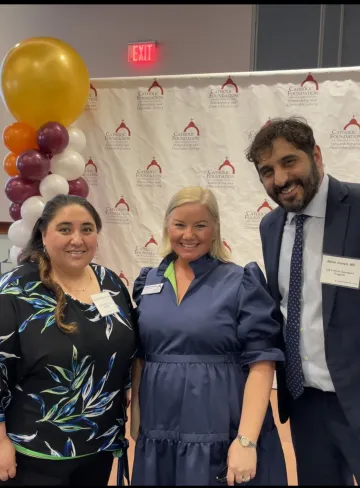Banner University Medical Center Tucson's Burn Center receives patient care and training grant

Banner University Medical Center Tucson’s Burn Center was recently awarded more than $87,000 to enhance its inpatients and outpatient care and augment training to bring the best of wound care to Southern Arizona.
The Catholic Foundation for the Diocese of Tucson St. Joseph Catholic Healthcare Committee awarded the funding in April to Banner University Medicine Burn Program Director Lourdes Castañón, MD, FACS, and Burn Program Manager Tonya Naughton, MSN, BSN, RN, MCJ.
Dr. Castañón, clinical associate professor with the University of Arizona’s Department of Surgery, says the funding will help the Burn Center make sure all patients are cared for, especially in response to the increasing number of patients who‘ve lost their jobs and housing during the COVID pandemic.
“We had a very large homeless population that would come in with burns or wounds that were difficult to take care of because they did not have insurance or the money for things like dressings,” Dr. Castañón said. “So when we applied for the grant, that was our number one goal, to see if we're able to get funds to help us build our infrastructure.”
Most of the grant, she said, will go toward providing equipment, supplies in an outpatient setting.
Additional allocations will target a range of investments across the inpatient spectrum of patient care and nursing education, said Banner Burn Program Manager Tonya Naughton.
Blanket warmers will help keep burn patients at risk of hypothermia warm, and Chromebooks for patients to communicate with loved ones. Specialized lamps will help detect corneal abrasions scratches on the surface of the eye with facial burns, and Nitrous Oxide N2o Oxygen Portable Systems will enhance relaxation and reduce anxiety and possible PTSD in burns and complex wound care.
The funding will also support advanced burn life support (ABLS) training for staff on the treatment of patients within the first 72 hours of being burned, especially those needing fluid resuscitation.
The need for expert burn care in Southern Arizona is high, Naughton said, in part because the Burn Center serves not only people from across the state, but also patients from across the border in Mexico.
“Before we started the Tucson burn program, the closest verified burn center resided in Phoenix, about a two-hour drive for most individuals. It becomes difficult for families to take that time off, or even access long distance transportation.
Even housing can be an issue,” Dr. Castañón said. “We're by no means in any competition with the Phoenix burn center; we actually work with them, but we’ve seen that there is an absolute need to have a high level of care within this region specifically for the reason that transportation's an issue, finances are an issue. It's very important for us to be able to remove the travel barrier."

